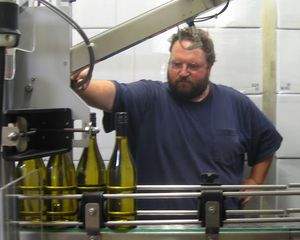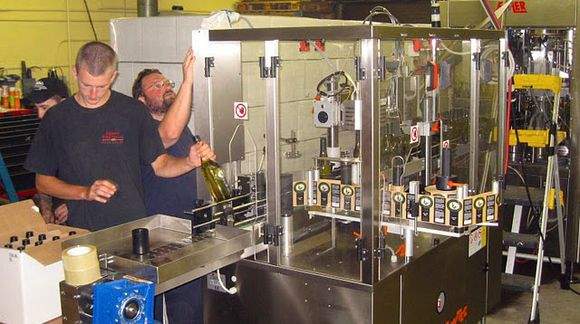In a matter of weeks, Heron Hill Winery customers will find many of the winery’s wines closed under screwcap. The winery recently completed the installation of a screwcap bottling line (pictured above) that owner John Ingle described as “not an insignificant investment.”
Ingle described the plan for Heron Hill wines in simple terms: The wines that need to be preserved for as long as possible — with no change or evolution that comes from gradual oxidation — will be bottled under screwcap. The wines that Heron Hill considers to be capable of evolving into something greater will be bottled under natural cork.
“The cork does breathe, and the screwcap does not breathe,” Ingle said. “So if you want the wine to evolve, it needs to breathe.” He explained that the Ingle Vineyard designation bottlings will continue to see cork closures, as will the Heron Hill reds, such as Pinot Noir, Cabernet Franc, and Eclipse. The Heron Hill line of Rieslings will be bottled under screwcap.
“It looks beautiful,” Ingle said about the first line of whites to be bottled under screwcap, the Game Bird White series. “I get a thrill every time I twist one of those things off. I feel like a part of the future has arrived.”
It’s worth pointing out that Ingle’s approach differs from that of another prominent supporter of screwcap closures: Paumanok Vineyards’ Kareem Massoud, who was recently profiled in NYCR by Science Editor Tom Mansell. Massoud sees screwcap as a safer closure, one that protects the fruit character of the wine. Ingle sees cork as an essential element in allowing a high-end wine to transform and evolve in the bottle.
Ingle explained that he was concerned about cork taint in Heron Hill wines, though he has not studied how frequently Heron Hill wines were showing discernible flaws from cork. “In my inimitable style of jumping out the window without looking, I decided it sounded like a great idea and we were going to do it,” Ingle said. “I want Heron Hill to continue to be a trend setter.”
 Winemaker Bernard Cannac (pictured top and at right) has been a big supporter of the winery’s shift. “We are using screwcaps only on wines that are more sensitive to oxygen, that is to say, wines that do not benefit much from bottle aging,” Cannac said. “The Game Bird wines are very fruity and fresh. To preserve them in this stage with a screwcap is a very good option, because the wines will stay as fruity and refreshing as they were the day they were bottled, or close to it.”
Winemaker Bernard Cannac (pictured top and at right) has been a big supporter of the winery’s shift. “We are using screwcaps only on wines that are more sensitive to oxygen, that is to say, wines that do not benefit much from bottle aging,” Cannac said. “The Game Bird wines are very fruity and fresh. To preserve them in this stage with a screwcap is a very good option, because the wines will stay as fruity and refreshing as they were the day they were bottled, or close to it.”
Cannac sees the proliferation of screwcap closures as a way to improve the quality of cork closures.
“Personally, I think that natural corks will always be used,” he said. “The natural cork market was seeing too much demand, which might have tempered with their quality. With the competition of the screwcap, it will ease this pressure on the natural cork demand, which production is limited by the number of cork oak trees available. In turn, the quality of natural corks will hit higher and higher standards.”
Regarding concerns about reduction or other quality issues with wines under screwcap, Ingle said research is on his side. “Wines are more predictable under screwcap,” he said.


